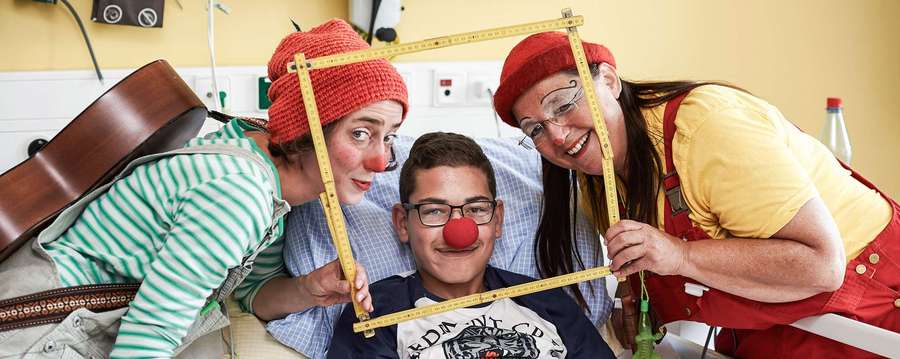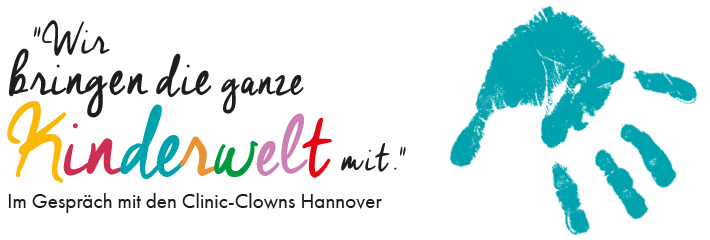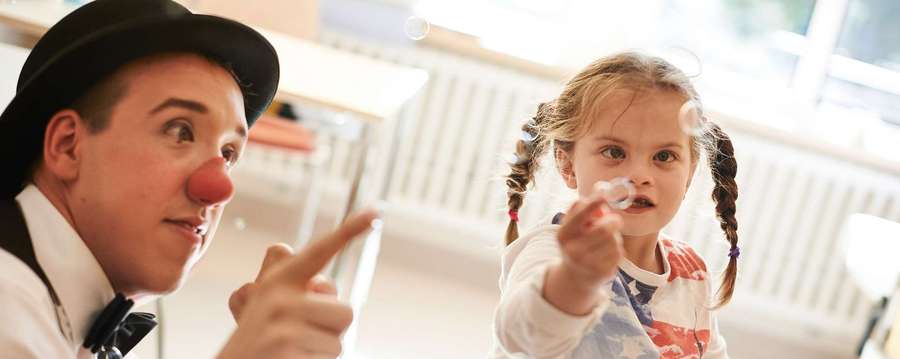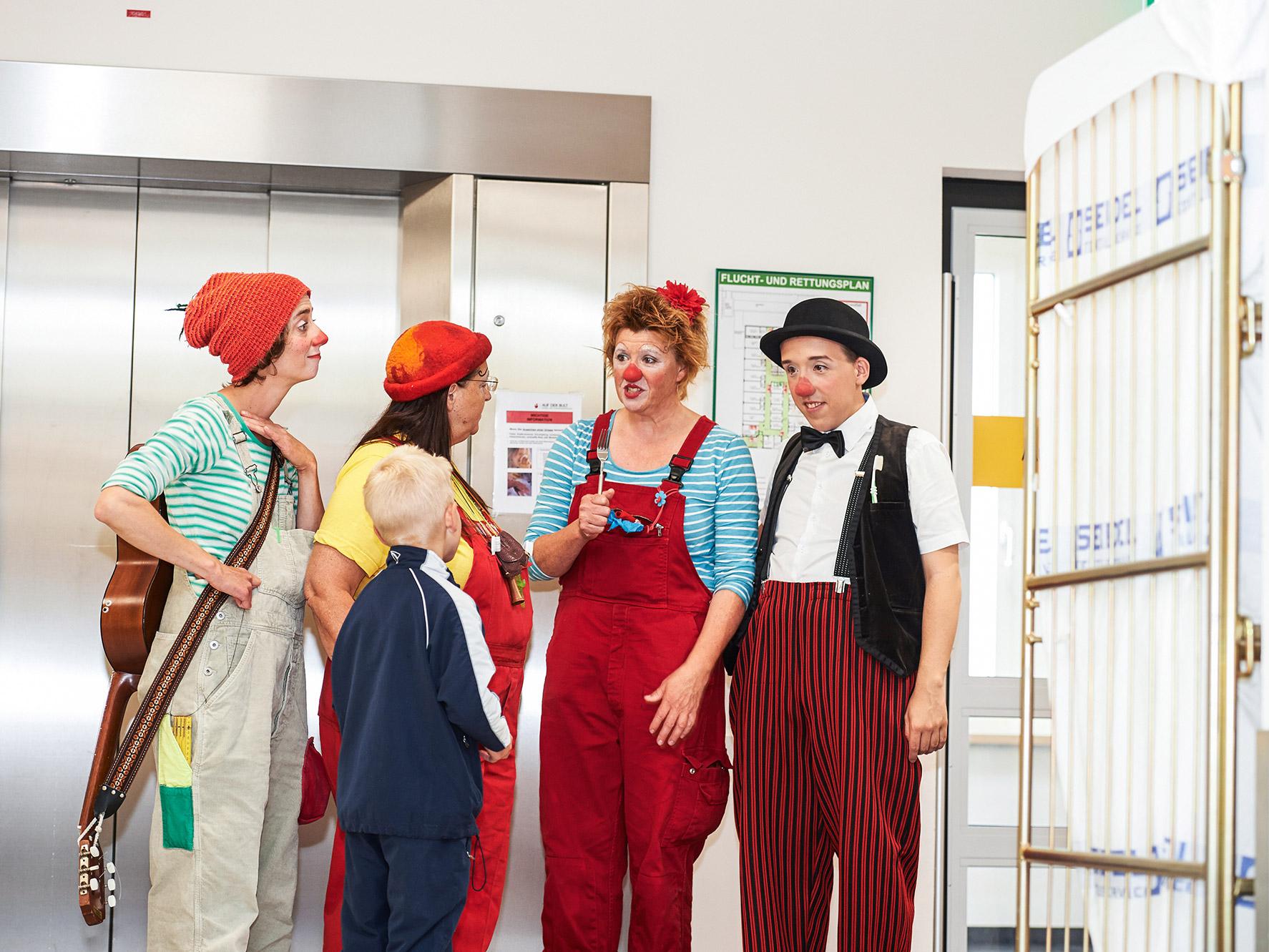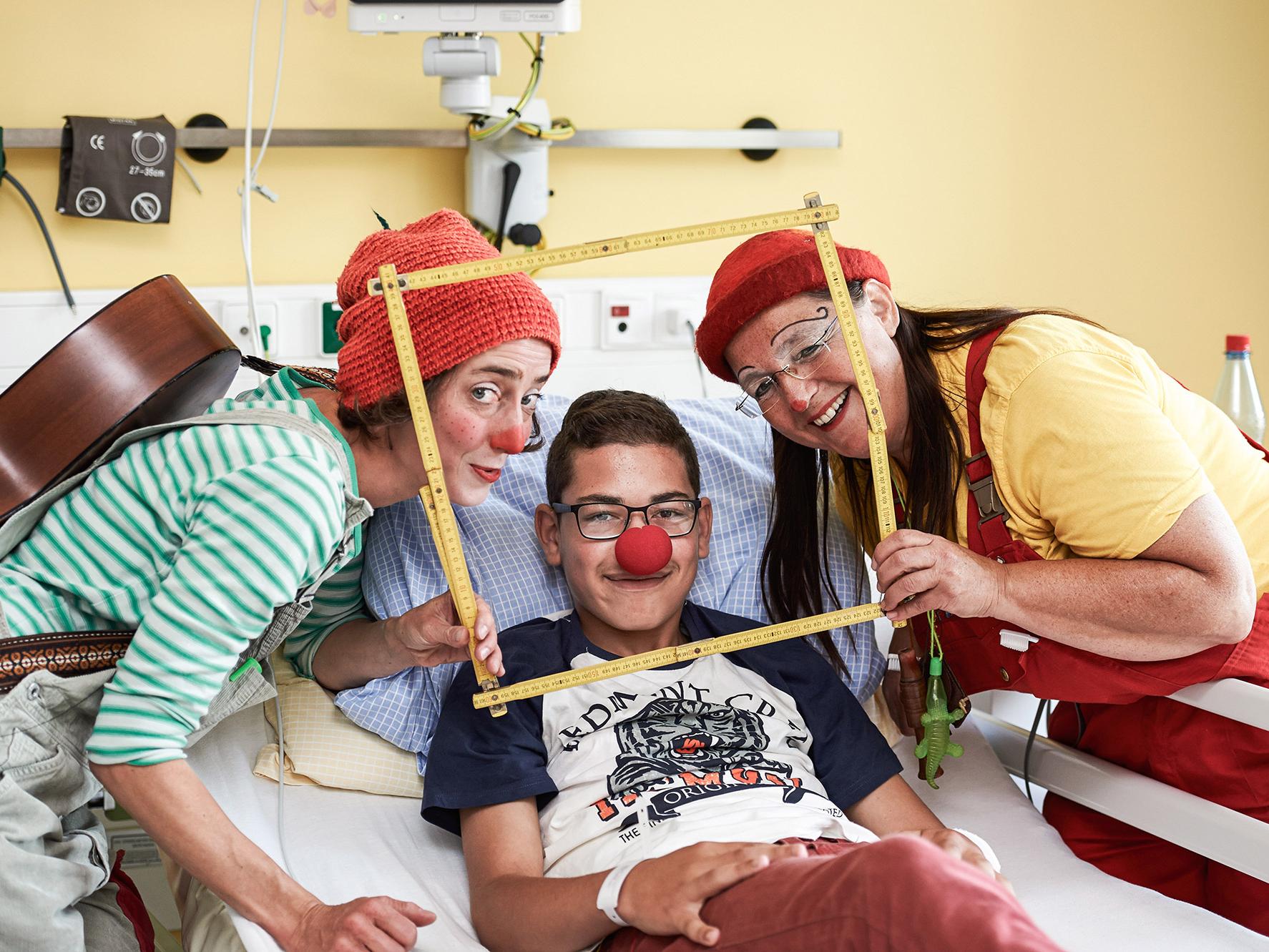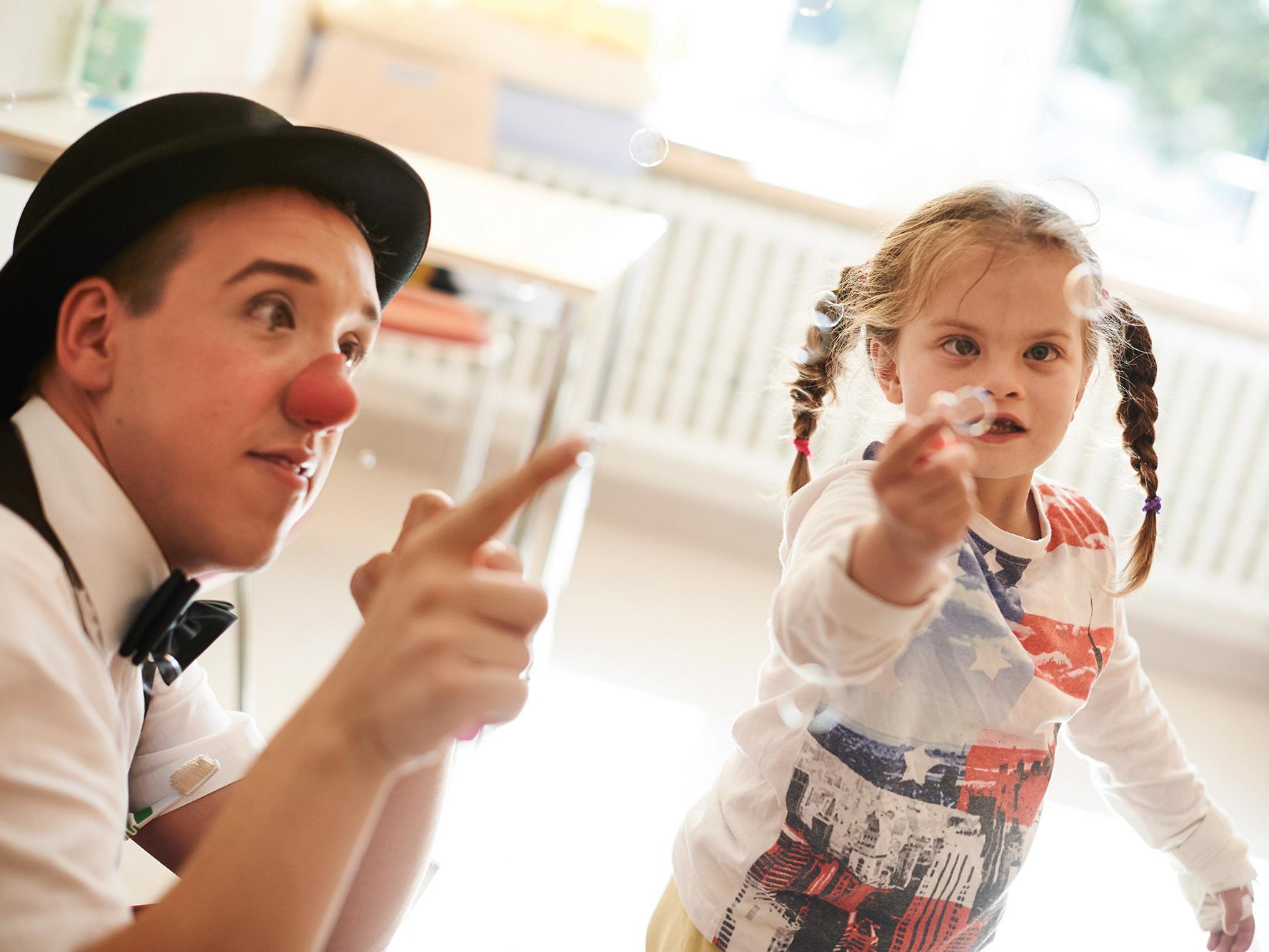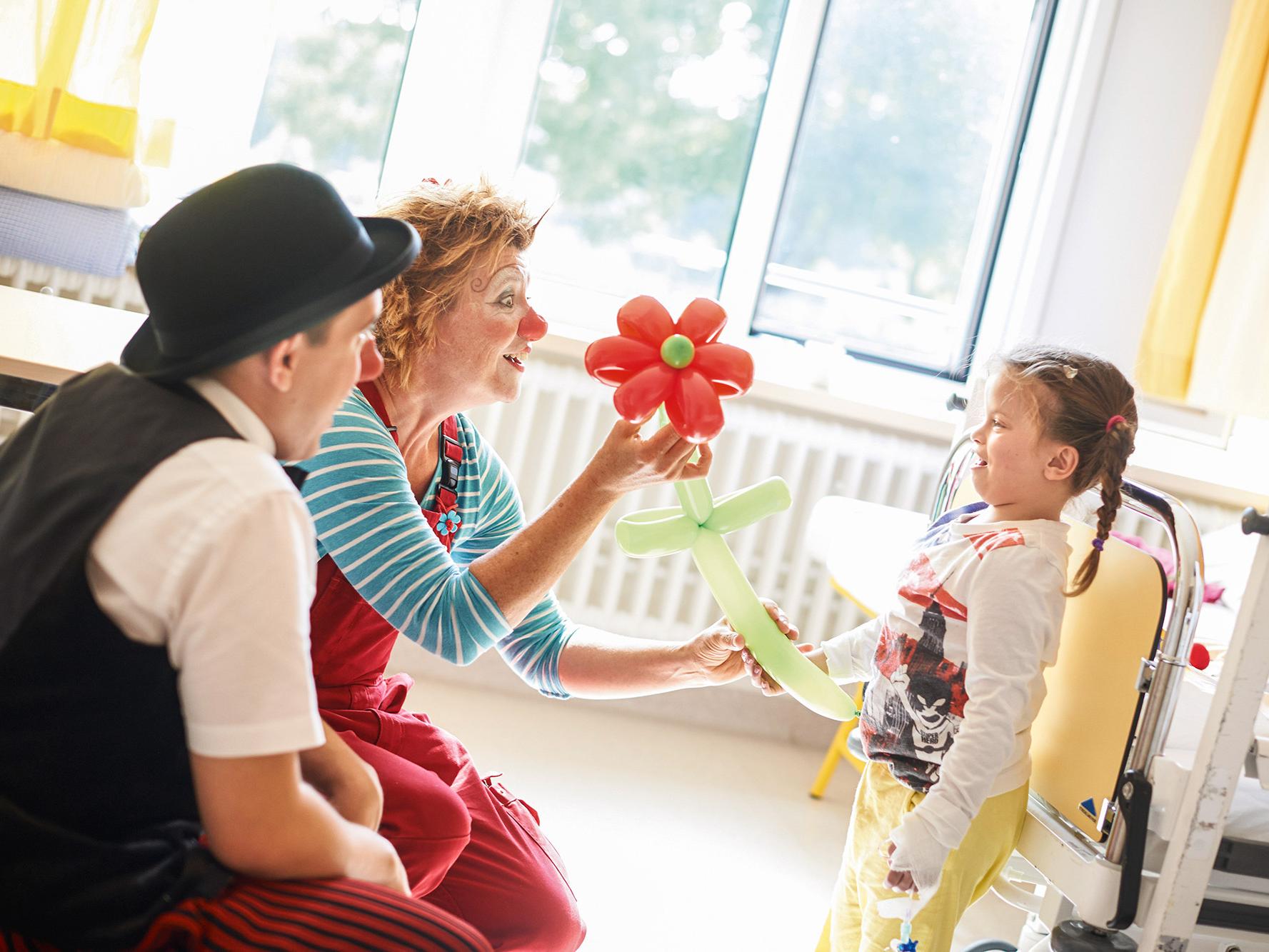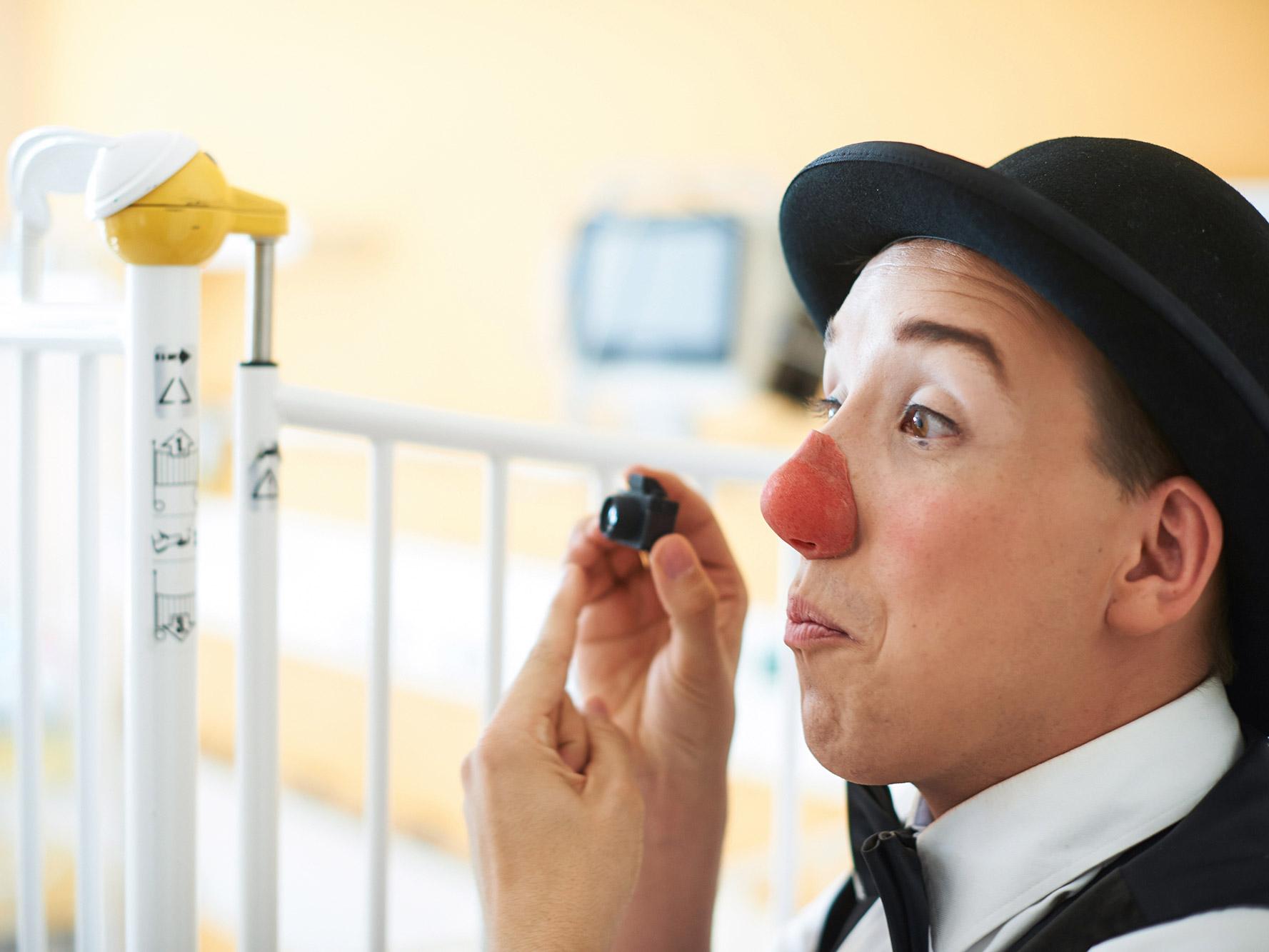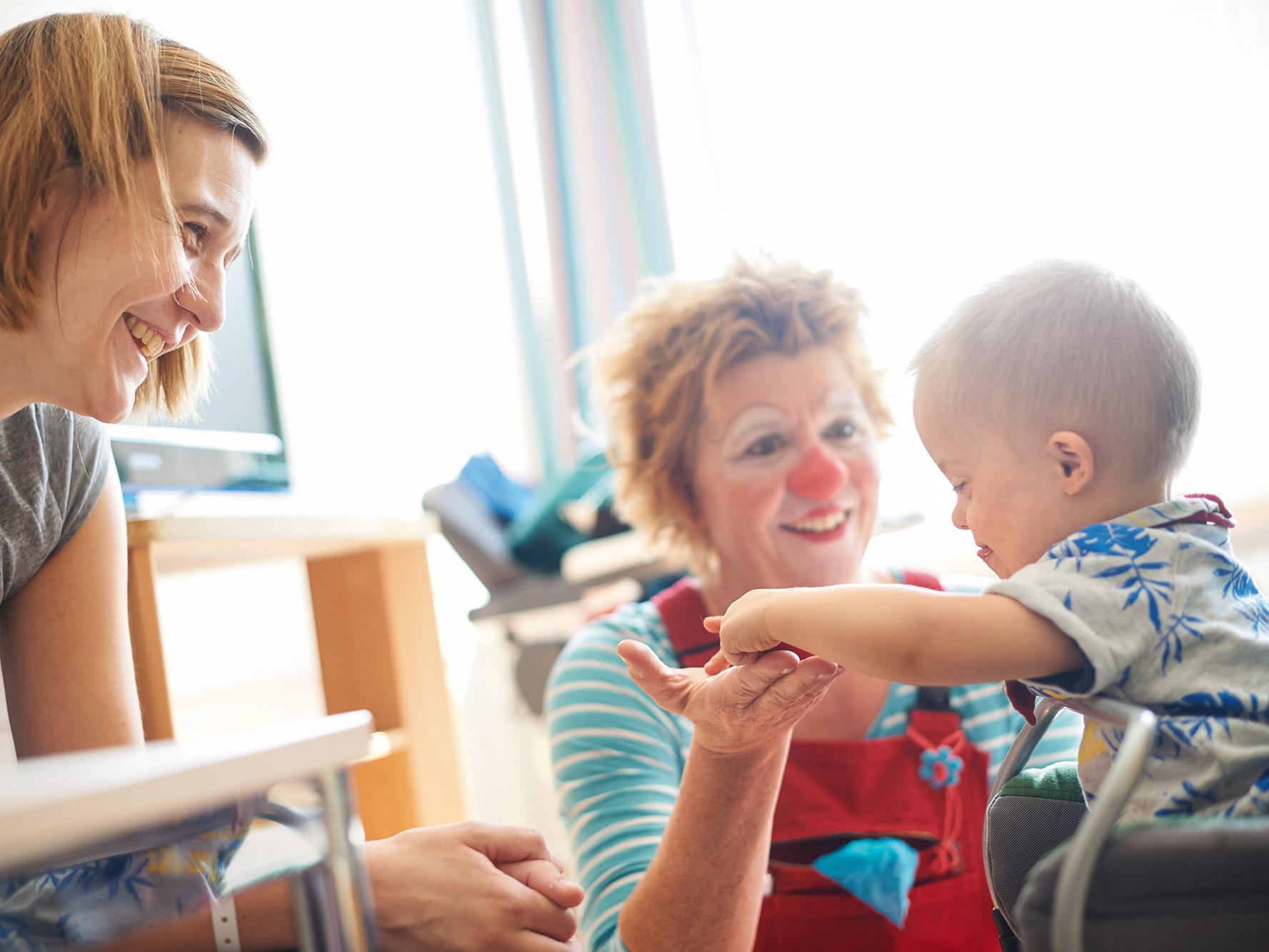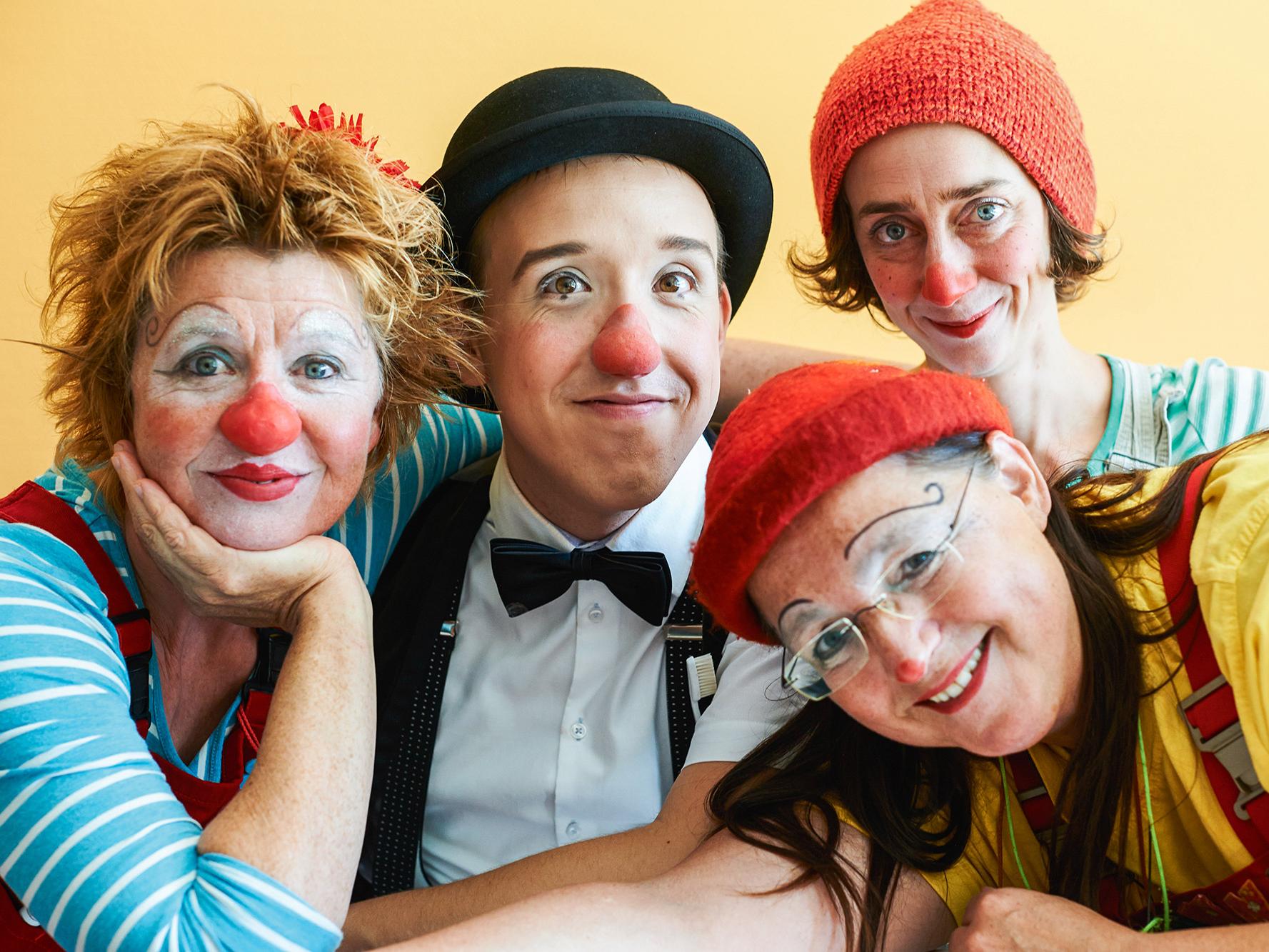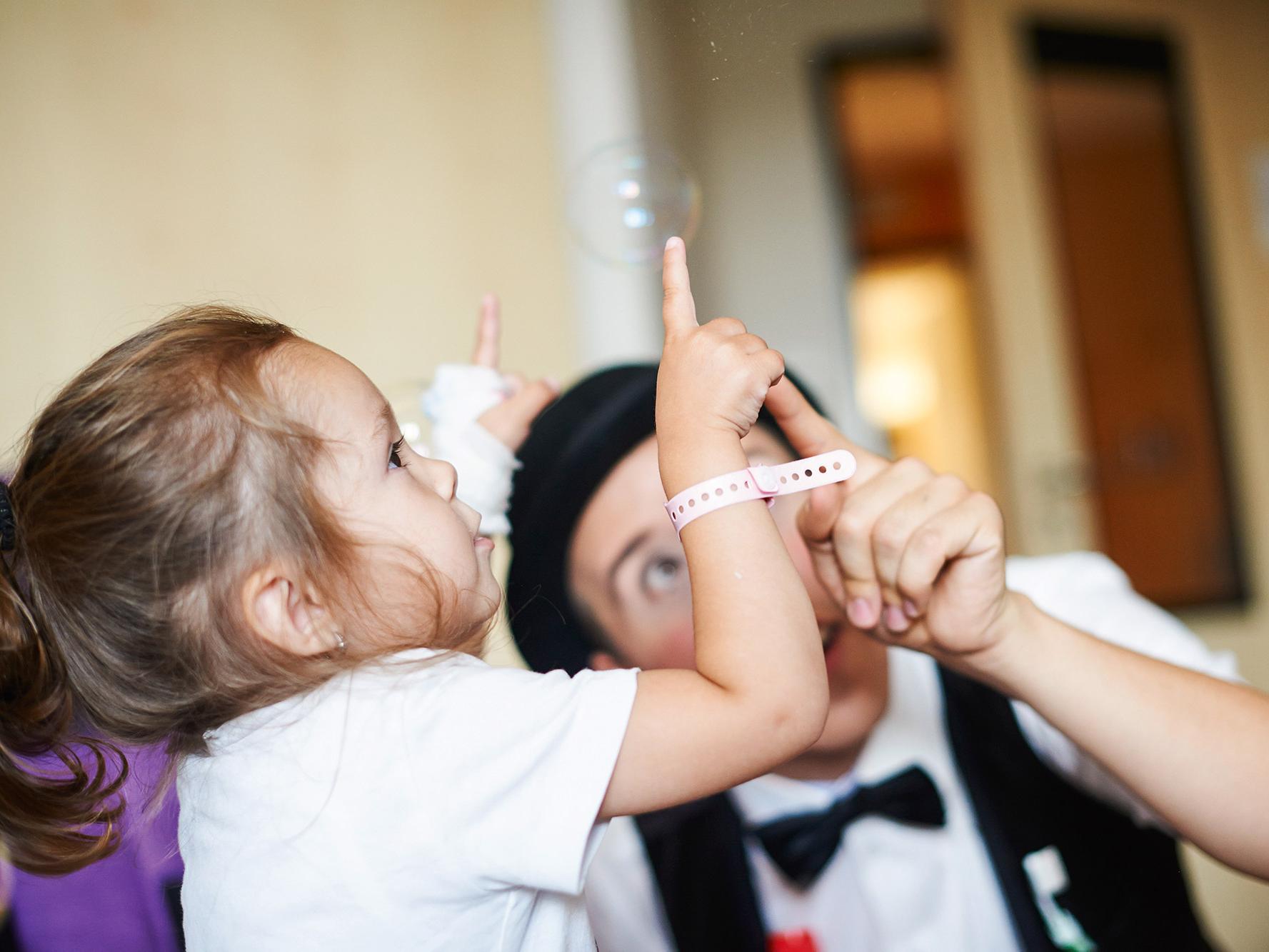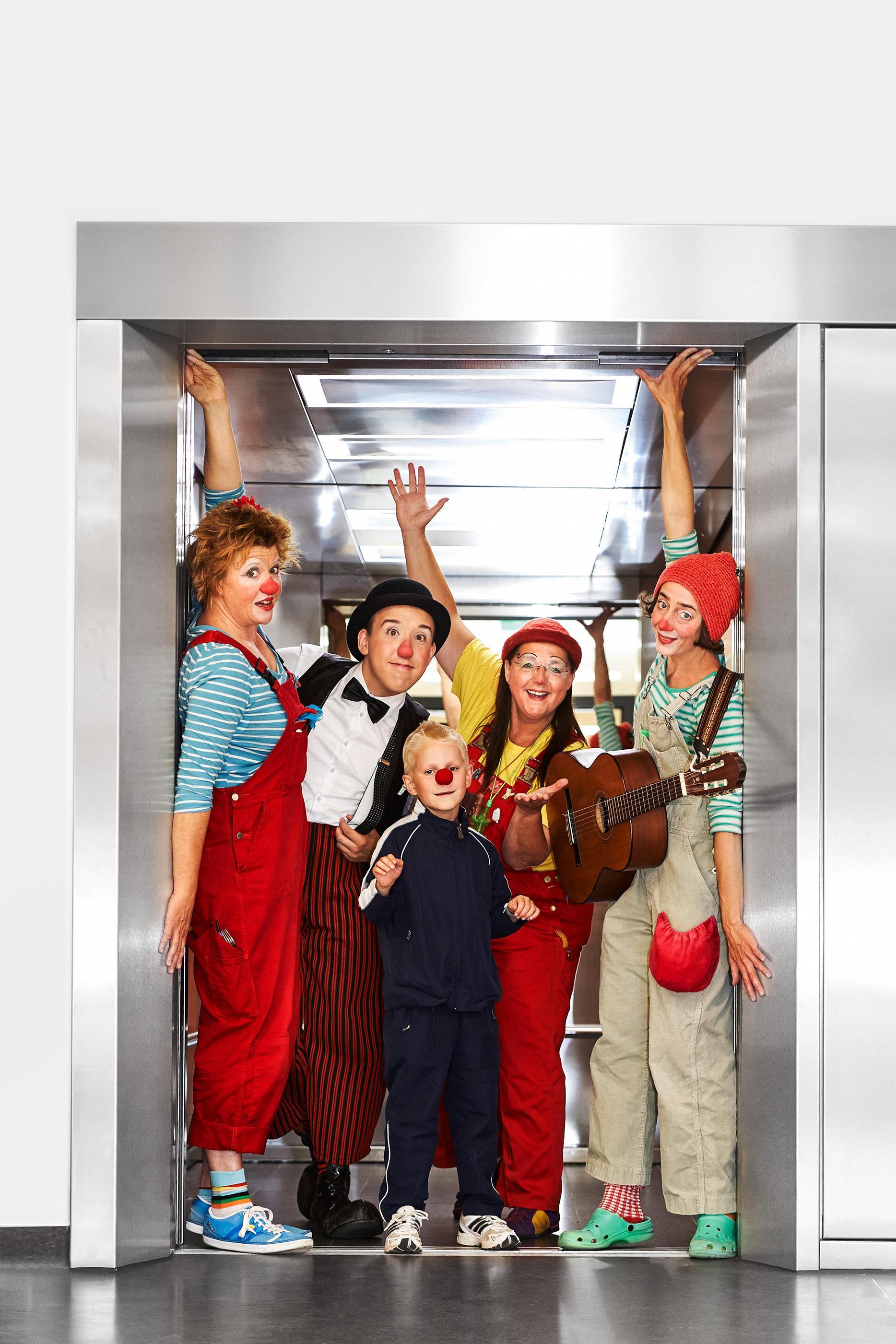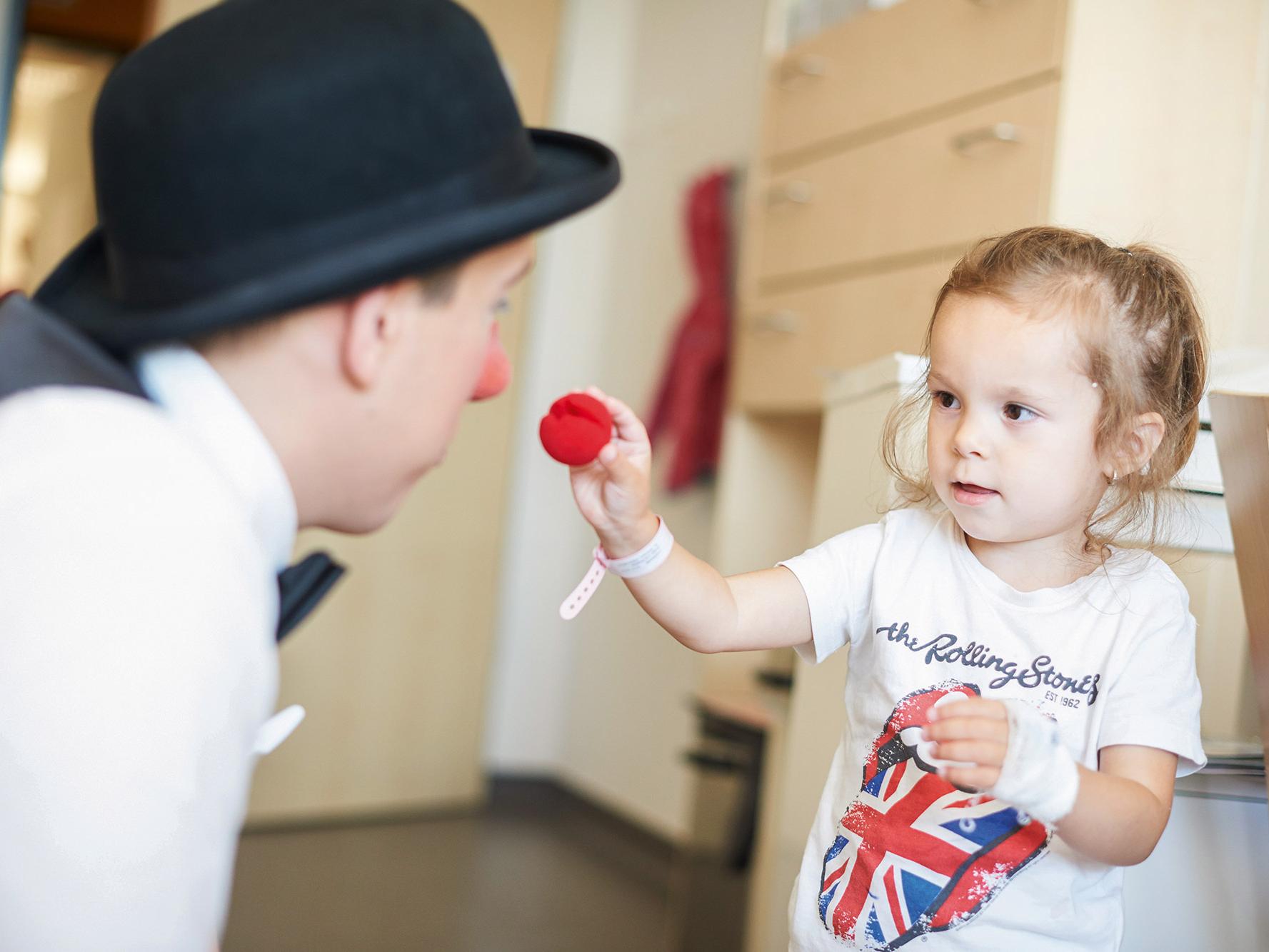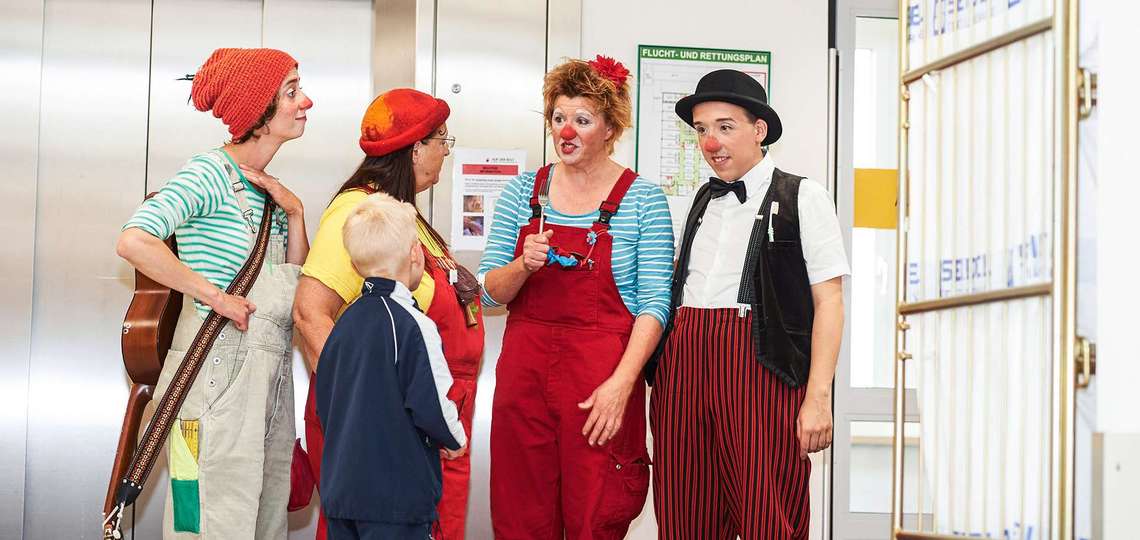
Fun for princesses and superstars
Clinic-Clowns Hanover at the paediatric hospital “Kinderkrankenhaus auf der Bult”
The corridor of the paediatric hospital “Kinderkrankenhaus auf der Bult” in Hanover is a busy place. Visitors, nurses and patients walk through with a purposeful air. They push equipment, wheelchairs or food trays along and then disappear with them into the rooms. But when 2 young girls appear, everything is suddenly different.
They are being closely watched by a group of clowns who stand behind a corner with red noses and colourful suits. “Hohohohoho”, says one of the clowns, a woman. “Do you know who those two are? They’re superstars! I just got them to give me an autograph”. The girls giggle and seem to be floating as if someone had rolled out a red carpet on the spanking clean floor.
Four clowns are going from room to room on this day: Petronella, with the furry hair, Socke, with the red cap, Fanny, with the baggy overalls and young Momo - the only man in the group. He is playing the poetic tramp so well today that it’s hard to imagine him as a normal person.
The four are part of Clinic-Clowns Hanover who visit the Kinderkrankenhaus auf der Bult hospital regularly. They are all experienced stage artists, many of whom appear at shows or festivals in the evening. A meticulously planned programme wouldn’t be much use at the paediatric unit. The art of improvisation is needed here at all times. A stay at the paediatric hospital is often linked with great worries and fears for young patients and their parents. The clowns push back on those fears by casting a new magical reality over the situation. “Are you on holiday here?” they ask a girl in pyjamas who is sitting in her bed. “Or, maybe even... wellness?” The girl and her mother laugh.
The clowns skip over language and cultural barriers effortlessly. Youssef, a boy who speaks Arabic, hardly knows what is happening: As he is peacefully watching television with his relatives, Fanny and Socke suddenly appear in his room and grab the remote control. All kinds of jokes, oaths and magical repairs take place around the TV. At first, Youssef is suspicious, but then he has to grin. The relatives grab their smartphones and photograph the scene.
The easiest to charm are the very young ones. Momo just needs to blow a couple of soap bubbles and the 3-year-olds are at his feet. He plucks a tiny camera out and runs around the room taking pictures. “Everything is in the photo”, he declares, “in black and white except I don't have white”. Momo randomly makes the bright red clown noses magically appear and disappear. A little girl is captivated by the act, but she adamantly refuses to have one of the fluffy things put on her nose. After all, even princesses and future superstars have a reputation to keep. The especially pretty soap bubbles are jealously guarded for 3 seconds, and then they pop.
The mothers laugh, and even get a few tears in their eyes. All of the tension of the past days loosens. “We give attention to every single person here”, the clowns explained before they get to ‘work’, “from patients to parents to cleaning crew. And we do a bit of good for everyone”. In the corridor they meet a boy being pushed in a wheelchair. The clowns pick up their guitar and sing a tune without a beginning and an end, but with a strong beat. The boy explodes with happiness. He sits up in his wheelchair and starts dancing with his upper body. The song goes on for minutes, as if the clowns have all the time in the world. Sometimes even a short bit of happiness is a piece of eternity.
Shortly before beginning ‘work’ at the children’s ward, anticipation grows among the clowns Anke Küpper (Petronella), Beate Brennecke- Köhler (Fanny), Antje Kilian (Socke) and Timo Lesniewski (Momo). But the quartet still takes time to answer a few questions.
How do you become a hospital clown?
Küpper: We’re all trained in this art. We visited the clown school in Hanover, created a character – and the hospital clown work builds on that.
Brennecke-Köhler: The clown is the star on stage but at the hospital, it’s the kids who are the stars. We never know what’s going to happen. We have a few routines we’ve practised, but once in the room, we improvise.
Is it easy to establish contact with the children?
Küpper: We feel our way slowly around the situation. Sometimes a child will say to us at the beginning, “No, you can’t come in!” but we still end up in front of the bed. We are a choice that’s on offer. Everything else here overwhelms children so often and they have no choice to say no to injections and treatments. But to us, they can say no. So we don’t come in. Instead we play with limits and try to slowly build up trust.
Brennecke-Köhler: Very close, magical moments often occur between us and the children. Afterwards, when you leave, you say: “Whoa, that was amazing”.
Kilian: One of our tasks is also to help the people in the rooms connect with each other. If we were there, the children often know at least the name of their neighbour and if he likes monkeys.
How do you handle fear, stress and sadness?
Brennecke-Köhler: Children and parents are in an exceptional situation here. But we can help very well. We bring the world of children to them. We don’t ask “How are you?”, we just say: “Here I am! What shall we do?”
Küpper: Or we ask: “Are you on holiday here? Or just hibernating for winter?” Then the kids have to laugh. We use the disinfectant as a perfume and find it quite delicious.
Do you take the sad stories home with you?
Küpper: As hospital clowns we are never helpless at the bedside. We can do something, and that changes the situation.
Lesniewski: If there is a story that disturbs us, we talk about it afterwards when we are undressing. That helps a lot. We also always work with the same team and go in pairs into patient rooms.
How are Clinic-Clowns financed?
Brennecke-Köhler: The association and the hospitals collect donations. We buy our materials ourselves and insure ourselves, because we are freelancers. When we go on holiday or are sick, we aren’t paid.
Are the health insurance companies interested in backing you?
Küpper: Our idea of an umbrella organisation in Germany has that goal. Having the health insurance companies back our work would be the dot on the ‘i’ for us.
Thank you very much for talking to us.
The interview was conducted by Kirsten Kaawar and Manuel Jennen.

